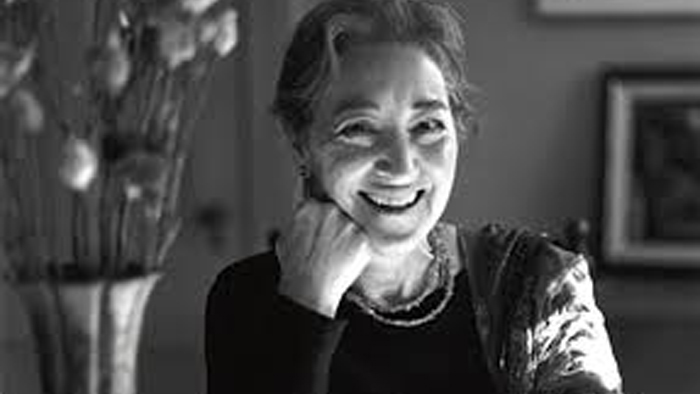
Senior Planet recently published this interesting interview on ageism with Margaret Gullettee (3/16/18). Dr. Gullette, a Resident Scholar at the Women’s Studies Research Center at Brandeis University, is a cultural critic who calls herself an age critic and theorist. ~Antonia
“Ageism is everywhere,” says 77-year -old cultural critic Margaret Morganroth Gullette. “And the ageisms go from insults that may be laughable to real assaults.” Dr. Gullette knows. A Resident Scholar at the Women’s Studies Research Center at Brandeis University, Gullette has written many well-received books, essays and articles on the subject. She’s now internationally recognized as an age critic and theorist. Agewise: Fighting the New Ageism in America (2011), won a 2012 Eric Hoffer Book Award. Aged by Culture (2004) was chosen by the Christian Science Monitor as a “Noteworthy Book of the Year”.
Great reviews of Dr. Gullette’s new book, Ending Ageism, or How Not to Shoot Old People, prompted us to interview her. It turns out, there’s not only more to say about ageism but much that each one of us can do about it.
Your new book, Ending Ageism or How Not to Shoot Old People, has just been published. You’ve already published several books on the subject. What prompted you to write a new one, and why that shocking subtitle?
The subtitle “How Not to Shoot Old People” came about because early on I recognized that people past midlife are often cruelly portrayed when street photographs are shot, or are completely absent from the public square (magazines, billboards). And I also learned that old men caring for ailing wives sometimes shoot them; many prosecutors take a lenient view of this particular murder. “Mercy killing.” No one asked the wives if they wanted that mercy.
The Alzheimer’s label causes a lot of cruelty itself. My research showed that some take advantage of the “senile” or “zombie” label for their own purposes. For example, because we can’t try a person incapable of defending him or herself, we have the phenomenon of criminals, including war criminals, using the “Alzheimer’s defense” to avoid prosecution. At age 75, as part of a plea deal, mobster Vincent Gigante finally admitted in court that he successfully feigned incompetence for decades to avoid prosecution. Dictator Pinochet of Chile tried it. One of the worst Cambodian dictators, Ieng Thirith, tried it. In international criminal courts, ex-dictators get a lot of attention to their remaining capacities. Our old people with unfeigned cognitive impairments, at home or in nursing homes, not so much.
I thought I had covered the main varieties and manifestations of ageism but when I collected these atrocities, and considered the extent of age-shaming, I realized that I had another book to write.
Does ageism cause special problems for older people?
An obvious but still under-estimated one is a 50+ year old’s challenge in finding or holding a job. “We need young blood.” That’s devastating, as well as illegal. But our own Supreme Court has made it harder to sue. Millions of people suffer from midlife job discrimination.
Many manifestations of ageism aren’t recognized as such. Take simply walking. Getting bumped or shoved on a street or college campus is rarely experienced by the football team captain, yet happens to older men and women. One story in my book is about a big white man, a former CEO, eighty years old, knocked down a subway stairs, who then needed an operation. I call this risk “walking while old.”
Can you offer other examples?
The micro-aggressions also matter. Recently a friend in a check-out line paused to consider how much additional cash to take, when suddenly a long, burly arm crossed directly in front of her. “Just push there,” he said pointing to the “No” button. When he saw my friend’s astonished expression, the young stranger said, “That’s what I always tell my grandmother to do.”
While the man’s unwanted action is a brash example of ageism, it’s usually more subtle. Older people sometimes don’t feel welcome in public places. They may get a cold shoulder – even be ignored – at a party or gathering. They may be passed over to make comments at a meeting or be treated with condescension in a variety of circumstances, as happened to a friend who was asked by a waitress “Can I help you, little lady?”
Addressing my friend “little lady” is disrespectful. I’ve coined the term “age-shaming” to cover examples of demotions such as that one as well as being ignored in social situations and outright job discrimination.
Does age-shaming have effects on older people?
Terrible effects. It can directly affect older persons’ sense of self and well-being. It can humiliate victims to the point of paralysis, so they tend to remain silent. No movement can form until people object. #MeTooAgainstAgeism is my new hashtag. We can – and should! – get active on behalf of the collective.
Is this why you created your “Declaration of Grievances”?
It is. Every successful liberation movement began with a document of grievances, including American independence from Great Britain. I realized that for anti-ageism to become a movement it, too, needed a preamble of justification and a list of grievances. I created a preliminary one; it’s in my new book and is accessible on the Internet.
What does aging with attitude mean to you?
It means always taking the next step in anti-aging activism.
That next step is different for every person. It can start by simply pushing back against it in our own lives as my friend did when the young waitress addressed her as “little lady”. She promptly told her she wasn’t “little” and did not appreciate being addressed “lady”. The waitress stammered that she didn’t know appropriate may-I-help-you? words. No doubt the young woman has since given the matter meaningful thought.
You can read more about Dr. Gullette and download her Declaration of Grievances here (https://seniorplanet.org/listen-ending-ageism/) .
Reprinted with permission
SeniorPlanet.org

